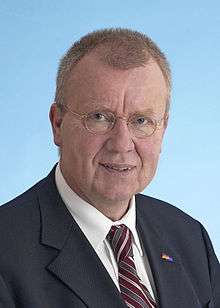Ruprecht Polenz
| Ruprecht Polenz | |
|---|---|
 | |
| Member of the Bundestag | |
|
In office 1994 – 2013 | |
| Personal details | |
| Born |
26 May 1946 Großpostwitz |
| Citizenship | German |
| Nationality | Germany |
| Political party | CDU |
| Alma mater | University of Münster |
Ruprecht Polenz (May 26, 1946 in Denkwitz near Bautzen) is a German politician and member of the Christian Democratic Union (CDU) political party.
Personal life
Polenz is married and has four children.
Political career
Member of the German Bundestag
Polenz became senior member of the CDU party on April 10, 2000 under the presidency of Angela Merkel.
Polenz served as chairman of the Committee on Foreign Affairs of the lower house of the German Parliament, the Bundestag between 2005 and 2013. He was secretary-general of the CDU from April to November 2000. He was also a member of the German delegation to the NATO Parliamentary Assembly and a substitute member of the Committee on Cultural and Media Affairs. Additionally, he chaired the Bundestag’s Parliamentary Control Panel under Section 41 (5) of the Foreign Trade and Payments Act and was a substitute member of the Joint Committee of the Bundestag and Bundesrat under Article 53 a of the Basic Law.
Life after politics
Following his retirement from active politics, Polenz became President of the German Association for East European Studies (DGO).[1] Between 2013 and 2014, he was a Senior Fellow at the Istanbul Policy Center of Sabancı University.
In November 2015, Foreign Minister Frank-Walter Steinmeier named Polenz Special Envoy for the German-Namibian talks on a joint declaration addressing the colonial-era crackdown against Hereros in Namibia.[2][3]
Political positions
In 2008, Polenz and four other legislators issued a committee report which concluded that Germany’s under-representation in international organizations at the time was because the country lacked a personnel policy and coherent strategy for promoting itself internationally.[4]
Contrary to his own party, Polenz has been one of Germany’s most outspoken proponents of an accession of Turkey to the European Union.[5]
In 2011, Polenz was among the first to speak out publicly against the decision of Quadriga, a German nonprofit group, to honor Prime Minister Vladimir Putin of Russia; the group later canceled its annual prize ceremony following further public criticism of Putin’s stance on democracy and human rights in Russia.[6]
Other activities (selection)
- ZDF, Chairman of the Television Board (since 2002)
- ZDF Enterprises, Member of the Supervisory Board
- Aktion Deutschland Hilft (Germany's Relief Coalition), Deputy Chairman of the Board of Trustees
- Association of German Foundations, Member of the Parliamentary Advisory Board
- Center for Global Politics (CGP), Free University of Berlin, Member of the Advisory Board[7]
- Christian-Muslim Society, Member of the Board of Trustees[8]
- European Council on Foreign Relations, Member
- Fachhochschule Münster, Member of the Board of Trustees
- Petersburger Dialog, Member
- Deutsches Orient-Institut, Member of the Board of Trustees (1998-2005)
- German Atlantic Association (DAG), President (1997-2006)
- Marshall Memorial Fellowship (MMF) of the German Marshall Fund (GMF), Member of the Selection Committee (1998-2002)
- Westfälische Herzstiftung, Member of the Board of Trustees (2002-2005)
See also
External links
References
- ↑ Ruprecht Polenz German Association for East European Studies (DGO).
- ↑ Foreign Minister Steinmeier on relations with Namibia Federal Foreign Office, press release of November 4, 2015.
- ↑ Theresa Krinninger (November 4, 2015), Polenz: "Ich habe Erfahrung mit heikler Außenpolitik" Deutsche Welle.
- ↑ Judy Dempsey (November 11, 2009), Letter from Europe: Germany Holds Back on Top European Roles International Herald Tribune.
- ↑ Ruprecht Polenz: Better for Both of Them – Turkey Ought to Be in the EU Körber-Stiftung, Hamburg.
- ↑ Nicholas Kulish (July 16, 2011), German Group That Cited Putin as ‘Role Model’ Cancels Prize After Outcry New York Times.
- ↑ Ruprecht Polenz Center for Global Politics (CGP), Free University of Berlin.
- ↑ Ruprecht Polenz Center for Global Politics (CGP), Free University of Berlin.
|